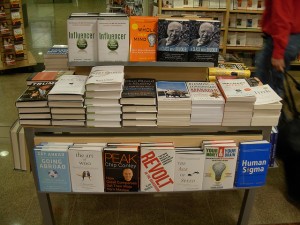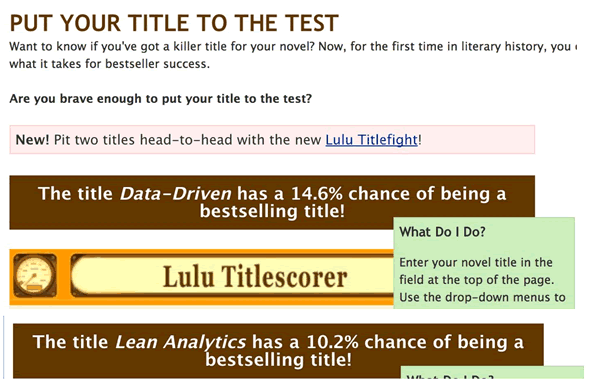What’s in a name?
As we’ve shared the idea of Lean Analytics, we’ve obsessed—as most authors do—with naming. When I co-wrote Complete Web Monitoring a few years ago, I talked to a friend of mine, author Mitch Joel, about its initial name: Watching websites. Ultimately, my co-author Sean and I decided that name would be misinterpreted as a book on online video streaming, and went with the more descriptive (but less sexy) title Complete Web Monitoring. When Mitch heard this, he shook his head in dismay: he thought that by clarifying what the book was, we’d dramatically reduced its audience to a particular subset.
 Every author wants an Airport Book. This is the kind of book that fills the racks in an airport bookstore. It makes you feel smarter for having bought it. It’s packed with little gems you can share at conferences. And it’s often got a compelling title: Made To Stick; Switch; Lean Startup. One-word titles, with few syllables, that have a verb in them, do well.
Every author wants an Airport Book. This is the kind of book that fills the racks in an airport bookstore. It makes you feel smarter for having bought it. It’s packed with little gems you can share at conferences. And it’s often got a compelling title: Made To Stick; Switch; Lean Startup. One-word titles, with few syllables, that have a verb in them, do well.
It turns out there is, and isn’t, a lot of research behind a successful title. There’s plenty of data on book sales, of course—so much that publisher Lulu even has a title-scorer app that uses research on bestsellers to predict (in a tongue-in-cheek way) what chance a title has of becoming a bestseller.
The advent of the electronic book, and its accompanying electronic bookstore, helps collect data on what people browse, and can give a publisher early indications of success in real time.
Electronic bookstores have also polarized purchasing: getting featured in online stores is key to success, as is getting mentioned by the Oprah of your particular industry (or, for that matter, Oprah.) Unfortunately, the choice of title, cover art, and other aspects of a book remain somewhat of a dark art for traditional publishers. This New York Times piece explains it in detail.
Most in the industry seem to see consumer taste as a mystery that is inevitable and even appealing, akin to the uncontrollable highs and lows of falling in love or gambling.
…
Eric Simonoff, a literary agent at Janklow & Nesbit Associates, said that whenever he discusses the book industry with people in other industries, “they’re stunned because it’s so unpredictable, because the profit margins are so small, the cycles are so incredibly long, and because of the almost total lack of market research.”
As analytics types, we don’t like this. My biggest concern is the bubble in which we live and write. Consider another book in O’Reilly’s Lean series, Ash Maurya’s Running Lean. I’ve told plenty of people about it; it’s doing really well, and Ash is in high demand as a speaker and subject matter expert. When a potential reader comes from the startup world, they get the title immediately. But outside our world? They think it’s a book on jogging to lose weight.
No, seriously: if you asked a million random people what the book “Running Lean” was about, what do you think they’d say? Here’s a post from a car tuning forum.
In our case, many people I’ve talked to in the business world (that is, in established businesses that are well past finding their product/market fit) think “Lean Analytics” is about doing web analytics on a shoestring budget, or about Business Intelligence with a minimum of technology. One even thought it was about lifelogging to shed pounds by tracking weight. None of those topics will leap off airport shelves. This presents us with a dilemma:
- If we target a market narrowly with a title that resonates, we’ll get good adoption within that market.
- But if we over-target the branding, we limit our ability to reach a broader audience.
It’s a tough balance to strike. It’s one we hope to understand through analysis and experimentation, but even then, this is difficult: we mostly know how to survey startup types. Tim Ferris did some in-store testing before choosing his title (making many of us wonder how many hours he squeezes into four hours.)
He took a book about the same size, put a bunch of different covers on the books, put them in the new non-fiction book section, then just sat back and observed people for the next few hours, watching their reactions. An overwhelming percentage, something like 300% more people picked up The Four Hour Work Week title than the others.
…
Ferriss and his writing team came up with 12 alternate names. To break the deadlock and to help finalize and write the great book title they eventually came up with, Timothy Ferris ran a Google Adwords campaign. ” He bought ads for relevant keywords for all twelve potential book titles and tracked which titles performed the best. The clickthrough rate for The 4 Hour Work Week was by far the highest, so that is what his book is called.”
As far as using Google Adwords to write a great book title, Ferriss proved it’s possible and as Zeigler reports, “a smart and novel approach to write a great book title. “Google Adwords is a cheap and real time focus group.”
Ben and I have a number of ideas for titles that might work. But they’re just ideas—hypotheses to be tested. We’ll try a variety of titles with different audiences and see what works, because that’s what analytical types do when confronted with uncertainty. Not sure whether we’ll camp out in bookstores, but ads and surveys seem like a good start.
On that note, we have a survey going right now with 5 name options. Previously we had many more, and ran a survey on new sign-ups for the book. After 70 or so survey completions, we took the five highest ranked names and updated the survey.
Please take a look here: help us name our book!
The survey takes no more than a minute to complete, and will be one of the data points we use in picking a final name for the book. Thank you!

